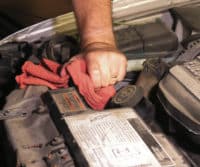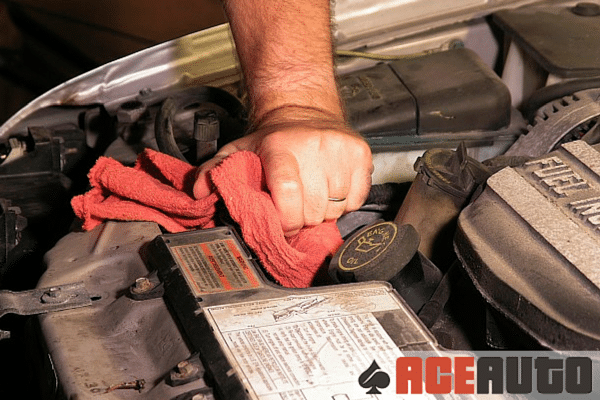Transmission Repair Specialists in West Jordan, Utah
Is your vehicle experiencing transmission troubles? We're transmission repair geniuses! We guarantee we can fix your transmission and get you up and running in no time.
READ MORE -

During the hot summer months in Utah you want your vehicle's AC to blow cool refreshing air for your comfort and the comfort of your passengers. There are a variety of reasons why your car AC is not blowing cold air. Fixing the AC could be as simple as recharging your car's AC refrigerant or repairing a refrigerant leak but may also require complex electrical climate control repair or slipping compressor clutch to get your air conditioning operating at top performance once again.
The air conditioning system in your vehicle can be complex due to the location of the hoses and lines. Essentially, your vehicle's AC system compresses and heats the refrigerant, then allowing it to decompress and condense into a liquid that causes it to rapidly lose heat. This process absorbs heat from the car's cabin and is continuously repeated to achieve your desired temperature.
The basic concept is much easier to understand when the components are broken down, as follows:
Just about every car has the same basic AC parts consisting of a compressor, condenser and evaporator that work together to keep you cool during the warm summer months. When any of these parts fail, you're left with uncomfortable heat that a rolled-down window just can't fix.
Here are the top 3 reasons why your car AC may not be blowing cold air:
The most common cause of a vehicle's air conditioner not getting cold enough is that it needs to be recharged. You can recharge your refrigerant by yourself, but to save time and make sure the job is done correctly you should make an appointment with your local professional auto shop.
The trusted professionals at Ace Auto in West Jordan, Utah can help you recharge your car's AC system. Give us a call at 801-447-1693 for a free quote to get you back on the road with the comfort and safety with a recharged AC blowing crisp, cool air again.
When your vehicle's AC system develops a refrigerant fluid leak it can be challenging to detect due to the fact that refrigerant fluid instantly evaporates when it comes in contact with air. A professional mechanic uses specialized tools to determine if there is a leak by introducing ultraviolet fluid to show signs of low refrigerant pressure in the AC system. Signs of an AC system refrigerant leak:
A refrigerant leak repair may include repairing or replacing the specific failing component. If a large amount of fluid has been lost, your AC system will need to be flushed and the refrigerant fluid will need to be replaced to function properly and get the cool air flowing. *Please note that refrigerant is a very harmful toxic chemical and should not be handled without the proper equipment operated by a trained professional.
Another common source of trouble in your car's AC system might be the fan(s) motor located at the front of the vehicle's motor. Whether your car has one or two fans, it is important that the fan is in good working order to both keep you cool and to provide vital cooling to your engine.
If you are unsure about the correct diagnosis of your car's failing air conditioner, the friendly and caring certified mechanics at Ace Auto in West Jordan, Utah will give you a free repair quote and work quickly to fix your AC and get you back out on the road.
If your car ac unit is not blowing cold enough air in Utah , contact the ASE certified auto mechanics at Ace Auto in West Jordan Utah to quickly inspect and repair your AC unit. For an honest AC diagnosis and speedy repairs in West Jordan, schedule an AC repair appointment at Ace Auto or call 801-447-1693 for a FREE repair quote. Our ASE Certified master mechanics are experienced technicians that are certified and can repair any AC system problem and have your AC working properly again.


With summer on its way, it's time to start thinking about readying your car for the heat and all its glorious travel opportunities. With a little preparation, you can be ready for a spur of the moment weekend getaway, and have the confidence that your car will get you there and back safely.
Winter weather can be hard on tires. This is a good time of the year to do a quick check on your tires. This should include inspecting the tread and verifying proper inflation. Poorly inflated tires impact grip which makes driving feel more erratic, can reduce your overall miles per gallon, and can even lead to a tire blowout. Always check tire pressure with a calibrated tire pressure gauge.
If you live in an area that permits snow tires, now is a good time to change them out for your standard warm weather tires. Also, check up on your spare. Make sure one is present, the correct spare for your ride, and that you have the tools to put it in should a tire blow. Nothing is quite as awful as discovering a missing jack at 3 am with a blown tire in the middle of nowhere.
Oil is another area that sometimes gets overlooked. Check the oil and adjust to suit the needs of your car. Your owner's manual for your car will list recommendations for your climate. Warm oil is thin oil, and oil that is not thick enough won't provide the lubrication necessary to keep your engine in good working order. If a dealership or garage does your oil change, ask after the viscosity of oil they are using to double check it’s the right version for your needs.
Overheating is a primary cause for summertime breakdowns. One great method to reduce the risk of this is to keep on top of your coolant maintenance. Your radiator should be flushed completely and refilled every other year and you should check the level, general condition, and concentration of the coolant once in a while between replacements. If you do the flushing yourself, dispose of the old coolant properly; it has a sweet taste that dogs love and it is highly toxic.
You want to keep an eye on your transmission fluid levels as well. Too much or too little, and you will run into problems that can, over time, lead to costly repairs. Further, make sure you read your manual to determine the correct mix of transmission fluid for your car. The SAE number found there will determine the right ATF mix.
Signs of too much transmission fluid:
Signs of too little transmission fluid:
On a swelteringly hot day, you want your A/C in good working order. If it's not blowing a nice frigid blast through your car, you likely are in need of additional refrigerant. Ace Auto Repair can help charge your A/C if it's not keeping you nice and cool.
As they say, an ounce of prevention is worth a pound of cure. Don't get stranded this summer on the side of the road with a smoking car. Bring your car into Ace Auto Repair in West Jordan, Utah for a summertime inspection, and we will check every element of auto maintenance listed above. Avoid summertime sadness and give your ride the basic service it requires to keep you on the road.


The radiator is one of those parts of your car that works quietly away without you every noticing…until it breaks, and then you really notice. This reservoir holds water and antifreeze to help keep your engine in tip-top condition. Engines create a ton of heat when they operate (and friction, but that's a whole other issue), and that heat can quickly destroy them unless it's cooled down. Enter the radiator, which draw heat away from your engine and protects your car from other temperature-related problems, like freezing during an especially cold night freeze.
However, radiators don't run perfectly forever. Their contents can grow old and contaminated, which leads to problems. This is where radiator flushing can prove especially helpful.
Antifreeze, engine coolant, and all related liquids run in constant cycles through an enclosed system, so they can last a long time. However, constant exposure to your engine does take its toll. Over time, coolants grow contaminated with other particles and stop working as well, eventually endangering your engine with overheating and corrosion issues.
A coolant flush simply cleans out your radiator system and replaces all your coolant with a new version. Generally it takes place in several steps. The old coolant is completely pumped out, a cleaner is pumped into the system to help clean it up, and then new coolant is added.
Go too long without a radiator flush, and your engine could destroy itself from the inside out, overheating and causing that dreadful scenario where you are stranded by the side of the road with smoke or steam pouring out of your hood. But there's a lot of other pertinent benefits too, including:
It can depend, so your owner's manual will have the most accurate information on when you should get a flush. For most cars, it's around 50,000 miles because it takes time for your coolant and antifreeze to develop problems, but they are affected by temperatures and driving habits as well as time, so some people may benefit from getting a flush more frequently.
Take your car into Ace Auto Repair for a coolant flush, and you will get the ASE certified treatment that you deserve. Our technicians can offer free repair quotes for any problems that they encounter, and use mobile diagnostic testing for quick results. All work guaranteed with us, so take a visit to our website and see how you can schedule a coolant flush.
Recent Comments